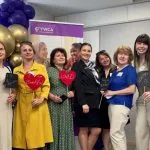
Moir credits his coaches-turned-colleagues for rediscovering his love of skating
MISSISSAUGA, Ont. — Tessa Virtue and Scott Moir came out of retirement to compete at the 2018 Olympics with a “stone cold” focus.
“T and I . . . we wanted to win, and nothing else,” Moir said.
Their ferocious gold-medal pursuit led to a fierce push and pull with Montreal coaches Marie-France Dubreuil and Patrice Lauzon, whose focus was on the process and not the outcome.
“They helped us understand that (gold) actually wasn’t the goal. Our goal was to be the best we could possibly be . . . but the double-edged sword of it is it allows you to be your best as well, when you have your priorities and you’re connected with the joy of skating and why you started skating,” Moir said Wednesday at Skate Canada’s national team training camp.

